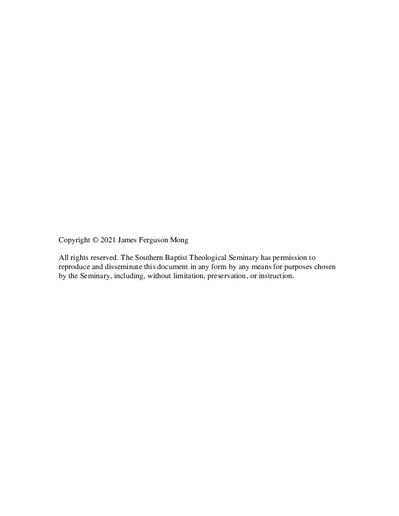| dc.description.abstract | Every individual possesses a conscience that testifies to both the moral framework of this world along with the way an individual relates to the moral framework and understands him- or herself.Considering the dearth of attention given to the conscience and the blatant antagonism to a moral framework in much of modern soul-care, effective counseling will acknowledge and correct the therapeutic ethos that dominates people’s thinking and living. Pointing to the presence of the conscience, the counselor will emphasize the reality of morality, moral agency, and the only path to acceptance, forgiveness, and wholeness through the cross of Jesus Christ. Proper identity formation, morality, and human flourishing will thrive or deteriorate according to the success or failure of a correct understanding of the personal conscience.
In the first chapter of this dissertation, I survey the present context of the ethical landscape in light of the predominant understanding of identity formation. The second chapter locates and defines the conscience in the human heart and in natural human experience. Moreover, because influential psychological schools of thought have overshadowed and patently mis-defined the conscience, this chapter explores the teachings of Scripture on the conscience, deriving a definition and understanding from this authority. The clear teaching of Scripture is that the conscience is an essential element of the human person, an internal testimony of God and his law, a means of understanding one’s identity, and a primary source of love. A healthy conscience plays a primary role in producing an outward focus and love in the human heart that leads to true human flourishing.
The third chapter considers the therapeutic overshadowing of the conscience in modern soul-care. The therapeutic ethos focuses on the priority of self, authenticity, disorder instead of sin, and victimization instead of moral agency, and it promotes “positive self-regard” at all costs. It is important to note how this therapeutic ethos has even permeated Christian soul-care practices. This chapter attempts to show the weaknesses and ineffectiveness of the therapeutic approaches to soul-care and counseling that dominate current practice.
The fourth chapter outlines the practice of addressing the conscience in soul-care and counseling. This outline includes the following foci: (1) counseling individuals toward an awareness of the working of their conscience; (2) counseling individuals toward an attentiveness to the voice of their conscience; (3) counseling individuals toward a correct informing and training of their conscience; (4) counseling individuals toward a proper appeasement of the guilt of their conscience; and (5) counseling individuals toward the role of conscience in identity formation.
The dissertation concludes with a summary of the role of the conscience in identity formation and soul-care. | en_US |

